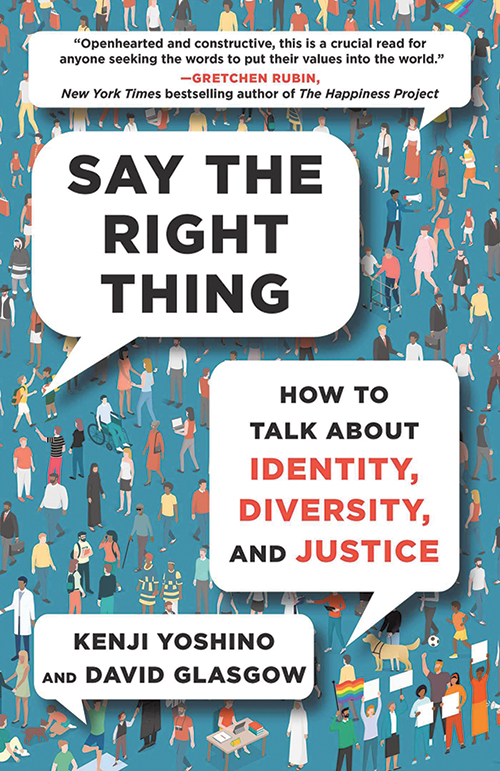
Say the Right Thing: How to Talk About Identity, Diversity, and Justice
Reviewed by Pamela Haines
September 1, 2023
By Kenji Yoshino and David Glasgow. Atria Books, 2023. 240 pages. $28/hardcover; $14.99/eBook.
Conversations about identity are hard. We may feel dizzied by change. Trying to be good allies, it’s easy to feel stupid. The more we care, the more we fear making mistakes. Yet hoping that silence or non-engagement can protect us might be the biggest mistake of all. In our attempt to do the right thing, however, we can get competitive and judge others who struggle. We bring unconscious assumptions to the table, not knowing what we don’t know. It can feel like our goodness as human beings is at stake.
Say the Right Thing speaks to all of these issues. Encouraging in tone, it is generous with those who struggle: never blaming, yet always holding out the possibility that more is possible. As two gay men, one being a Person of Color, the authors have experiences on both sides of these conversations. They are open in sharing stories about stretching outside their comfort zones and making mistakes as allies, even as they have personal experience of being on the receiving end of non-inclusive behavior.
As do the best of handbooks, Say the Right Thing has an accessible format and organization, and it is full of stories and practical tools. Clear subheadings help organize the material, and a short list of key takeaways concludes each chapter. A simple grid organizes common emotions that may accompany hard conversations and options for reframing our response. Another offers possible language to use in different contexts with people who exhibit non-inclusive behavior. A diagram of concentric circles reminds allies to share our negative emotions with those who are less involved, rather than with our conversation partners.
Some insights from each chapter may serve as appetizers. In addressing conversational traps (avoid, deflect, deny, attack), the authors conclude by asking how we would feel if we were trying to discuss a justice matter close to our hearts, yet all the attention of others was on managing their own discomfort. In a discussion on adopting a growth mindset in the chapter on resilience, the authors introduce the “Magical Yet” (inspired by a children’s book of the same name): I’m not good at talking about race . . . yet. They suggest that the shift from avoiding discomfort to embracing new learning opportunities—ideally within a supportive community—is a critical one.
Readers are reminded in the chapter on curiosity that those of us with more privilege can manage comfortably without knowing much about others. But trading in some of our often unconscious self-assurance for more curiosity and adopting a working hypothesis that we’re the ones who don’t understand could go a long way toward making us better allies. In discussing disagreements, the authors are clear that we need to be able to disagree at times, but it helps to be aware that what may seem to be a straightforward policy issue might be for another an issue of basic human dignity.
On apologies and the knotty question of intent versus impact, a focus on the purity of our motives usually leads to a dead end. While there should be some space in the picture for our intentions, we need a greater emphasis than many of us are comfortable with on the impact of what we do or say. The authors refer to the Platinum Rule (an enhancement to the Golden Rule): “help others as they would wish to be helped.” Some situations call for allies to step up, others for them to step back. Finally, they encourage readers to be generous. Sharp condemnation of non-inclusion can be an enticing way of reinforcing our own self-image, but we are warned that “[y]ou should be an ally to the source of non-inclusive behavior because someday the source will be you.” Maintaining a distinction between what someone does and who someone is will always serve us well.
Identity conversations are inescapable, and these are important times. Those who have been disempowered increasingly challenge behaviors they tolerated in the past, even as troubling movements are growing to entrench inequalities and undo long-standing rights. We are reminded that important civil rights work is being done not only on the front lines but in our classrooms, break rooms, and living rooms, and there are conversations that only we, as individuals, can have. This book could be an invaluable resource wherever teen or adult Friends gather to pursue greater inclusion.
Pamela Haines is a member of Central Philadelphia (Pa.) Meeting. Author of Money and Soul, her newest titles are a second volume of poetry, Encounters with the Sacred and the Profane, and Tending Sacred Ground: Respectful Parenting. She blogs at pamelahaines.substack.com.



Comments on Friendsjournal.org may be used in the Forum of the print magazine and may be edited for length and clarity.